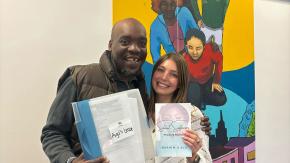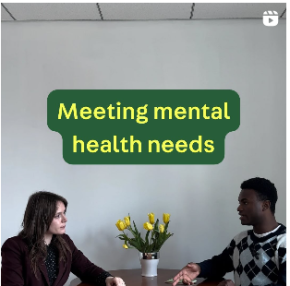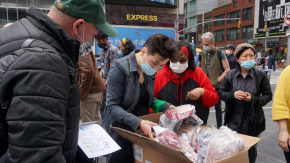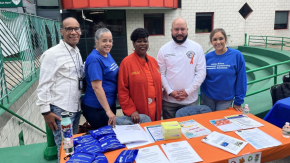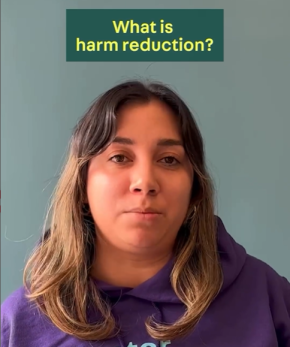Mental Health Is Justice

Far too many people come into contact with the legal system due to underlying mental health needs. Traditional responses within our justice system often leave these issues unaddressed.
We work within the legal system and in the community to address underlying mental health challenges as early as possible. Connecting people to long-overdue care is a through line in our work to break the cycle of justice involvement, cultivate lasting safety, and help communities thrive.
Listen to our new episode on anti-Blackness in mental health services on New Thinking.
Paving the Way with Mental Health Courts
$33 Million Investment in Mental Health
In April, New York Governor Kathy Hochul visited our Midtown Community Justice Center to announce a $33 million investment in mental health support for people involved in the criminal legal system. The investment will support more programs like the Misdemeanor Mental Health Court we help run in Manhattan, which fosters lasting safety by linking people in the legal system to services and care in their communities.
Story of Success
Ibrahim Ayu is a former participant of the Misdemeanor Mental Health Court who spoke with CBS News New York about his experience with our Midtown Community Justice Center. Here he is with social worker Mel Hodor holding his new lease and his book. He’d been homeless for over five years and finally moved into his own apartment!
Brooklyn Mental Health Court
The first mental health court in New York City, the Brooklyn Mental Health Court crafts meaningful responses to people with mental illness who are facing felony charges. Addressing both treatment needs and public safety concerns, the court links people with serious and persistent mental illnesses or neurodevelopmental disorders who would ordinarily be jail- or prison-bound to long-term treatment in their community.
Mental Health Needs in the Courtroom
People facing mental illness who are charged with lower-level offenses often slip through the cracks of the legal system, even when they ask for help. The Arc profiles our special Manhattan court program working to change that, bringing mental health support and other vital services to people with complex mental health challenges.
Read more on The Arc.
Misdemeanor Mental Health Courts
The Misdemeanor Mental Health Courts in Manhattan and Brooklyn connect people with mental health needs accused of low-level charges to a wide range of resources, from mental health treatment to support with housing, employment, and more. Participants have an opportunity to avoid the lasting harms of a criminal record while receiving help for the needs that may have contributed to their contact with the legal system.
Read the Manhattan fact sheet.
1,365 people have graduated from our Brooklyn Mental Health Court as of 2023
290 cases have received supportive, alternative programming in misdemeanor mental health courts in Brooklyn and Manhattan
Prioritizing Mental Health Support
Connecting people with mental health needs to meaningful support is vital throughout our legal system and in the broader community, not only in specialized courts. Ensuring communities have access to the tools and resources they need to address mental health needs even before people come into contact with the legal system is key to strengthening the health and safety of neighborhoods.
Programs like our Youth Impact, Red Hook Community Justice Center, and Queens Community Justice Center offer supportive groups and counseling for people who need these services, reducing the likelihood of being caught up in the justice system.
In the Courts
Our court-based programs, like the Red Hook Community Justice Center and Bronx Community Solutions, assess the needs of people facing charges and offer mental health services to those who can benefit.
In partnership with the New York County Supreme Court, our Manhattan Justice Opportunities team creates individualized treatment plans to connect people with felony charges to mental health services, job training, substance use treatment, and a range of other services.
Across the United States
We supported Los Angeles County with implementing its Rapid Diversion Program, which offers meaningful pathways out of the legal system for people struggling with mental health challenges.
Care Before Crisis in Upstate NY

In Syracuse, NY, our team brings support to people facing mental health and substance use challenges before they find themselves in the courtroom. Meeting people where they are in this way opens up access to resources that many struggle to reach, while also reducing the chances that they’ll become involved in the criminal legal system in the first place.
Read more on The Arc.
Social Spotlight: Meeting Mental Health Needs
Watch this short video on our Instagram page to learn more about our work supporting people who are neurodivergent navigating the legal system.
Follow us on social media for more.
Mental Health at the State of the Judiciary
At the State of the Judiciary speech, Chief Judge Rowan D. Wilson shared the podium with our own Manhattan Justice Opportunities project director Joseph Barrett and graduate Ronette Cordett, who shared her story as a participant in our Felony Alternative-to-Incarceration program and said that “the people at court knew she was more than her trauma.”
Community First
We take a trust-building approach to supporting people struggling with mental health challenges and housing insecurity in the Times Square area. Our community navigators provide people with vital resources like clean clothes, hygiene kits, and health supplies, while slowly building trust to connect them to longer-term services for mental health, substance use, and housing needs.
Family Court Programs
We provide individualized care for parents and children involved in the legal and child welfare systems to help foster healthy, thriving family relationships. In family court, the Strong Starts Court Initiative helps strengthen attachment relationships between parents and their young children, disrupting cycles of trauma and system involvement.
Supervised Release
As one of New York City’s Supervised Release providers, we help reduce the harms of pretrial incarceration by connecting people to meaningful services in their communities while they wait for their criminal case to be resolved. Case managers link participants to help for underlying challenges—including mental health needs—while working to prevent the profound disruptions and trauma often caused by jail time.
Working with Youth, Addressing Trauma
"Two Battlefields": Opps, Cops, and NYC Youth Gun Culture
Our study of more than 100 young gun-carriers in Crown Heights, Brooklyn documented that this group of predominantly young Black men, ages 15 to 24, reported near-universal experiences of physical harm and trauma, all experiencing, witnessing, and being threatened with violence at shocking rates. Living in constant fear and with few other means to ensure their safety, many young people turned to gun-carrying for self-preservation. For most youth, fear for their own lives and the lives of their families outweighed concerns about going to jail. In-depth interviews were conducted by researchers with personal connections to the young people’s social networks, opening up levels of trust and honesty rarely found in prior research.
Reducing Harm and Preventing Overdose
The overdose crisis has affected millions of our friends, family members, and neighbors. To save lives and build safer communities, we have to offer people low-barrier, meaningful services no matter where they are in their journey.
Substance Use, Overdose Prevention, and the Courts
The Center for Justice Innovation and RxStat convened practitioners in the criminal justice, court, and public health systems to discuss substance use treatment and overdose prevention and the integration of harm reduction principles. Resulting from this forum of experts, this document maps many of the court-based substance use interventions currently utilized across New York City.
What We Can Learn from Harm Reduction
Harm reduction can take many forms, but the basic goal is to help people limit the harms—physical, psychological, and social—associated with certain behaviors, especially substance use. That can mean teaching people about overdose risks and prevention strategies, giving out naloxone and showing people how to use it to reverse an overdose, offering fentanyl strips for people to test the substances they’re using, or—in the longer term—helping people heal from traumatic experiences.
Read more on The Arc.
Social Spotlight: What is Harm Reduction?
When we meet people where they are—leaving judgment and stigmas behind—we make it easier for people who are facing substance use issues to get immediate, life-saving help. Learn more about our approach to harm reduction from AJ Garcia, Deputy Director of our Recovery and Reform team.
Follow us on social media for more.
On New Thinking: Oregon Recriminalizes Drugs, Rolls Back Measure 110
In Oregon, Measure 110 decriminalized the possession of small amounts of drugs—hard drugs like heroin, meth, and fentanyl. Instead of punishment and jail, hundreds of millions of dollars were earmarked for treatment. On our New Thinking podcast episode, When Policy Isn’t Enough: Drug Decriminalization Ends in Oregon, hear from Morgan Godvin, who was at the forefront of of getting Measure 110 passed in Oregon. Part of what went wrong, and why the policy is being rolled back, was a challenge for any reform: implementation. A policy victory is one thing, but how do you make a sweeping new approach work on the ground?
Listen to the episode.
A New Approach to Substance Use in the Courts: Recovery and Reform
The Center has worked with treatment courts—at the intersection of substance use disorder and the criminal legal system—across the country for years. In that space, mental and behavioral health is a key issue. People coming into treatment courts are a high-risk, high-needs population and there are many moments where the system can be doing a better job of connecting people to services—those with histories of substance use, mental health needs, and trauma. In recent years, our Recovery and Reform team's work has naturally started moving "upstream," to earlier intercept points where we can better help people who are entering the criminal legal system with these challenges.
Office of National Initiatives: Recovery and Reform Team
The Recovery and Reform team provides high-quality training and technical assistance to improve community and legal system responses to behavioral health and reduce harm to individuals and communities. This work is guided by our values: person-centered practices, equitable collaboration, transformative impact, and an anti-racist and anti-oppressive framework. Learn more about this team's work and how they can assist jurisdictions and communities across the country.
Read the fact sheet.

The Future of Recovery and Reform
Read a conversation with our Recovery and Reform team on their new name, the intersection of the criminal legal system and substance use, and what it means to take on racial disparities in treatment courts.
Learn more on The Arc.
Dig Deeper
- Video: Community Researchers Connect with Young Gun-Carriers for Groundbreaking New Report
- The Arc: Taking Trauma Seriously: How Trauma-Informed Practices Can Help People Heal
- Report: Beyond Bail Reform: Supportive Services in New Jersey
- Vital City: People With Serious Mental Illness Need Housing, Not Jail


